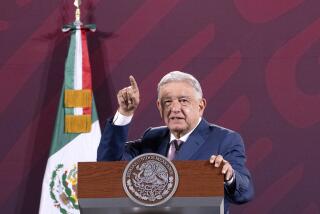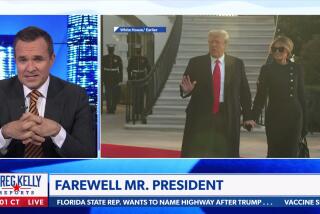Drama Builds in Battle Between Two Mexican TV Companies
- Share via
MEXICO CITY — It’s not every day that a power struggle between two television companies prompts comparisons to the melodramatic plot twists of telenovelas. But that’s what’s been happening here since Dec. 27, when employees of media giant TV Azteca took control of a Mexico City transmission antenna belonging to the scrappy independent broadcaster CNI Canal 40.
Some CNI Canal 40 employees have accused TV Azteca of sending armed commandos in black ski masks who made threats and even used physical force, a charge TV Azteca officials have strenuously denied. Ciro Gomez Leyva, CNI Canal 40’s editorial vice president, has denounced the bigger company for waging what he calls a “dirty war.”
More than a month later, angry words continue to fly, a protracted court fight looms and President Vicente Fox is being criticized for not doing enough to resolve the issue.
After a judge’s ruling last month, CNI Canal 40 temporarily retook control of the antenna and resumed broadcasting. But Azteca has vowed to regain the signal while pursuing legal action against CIN Canal 40’s owners, whom it has accused of backing out of an alliance between the companies.
What could ultimately be at stake, some analysts say, is the variety and independence of the Mexican TV industry and its financial credibility in the eyes of outside investors. Others said the dispute points to the need for new rules governing Mexico’s telecommunications industry.
The clash between the two companies dates from late 1998, when then-financially strapped Canal 40 entered into a joint venture with Azteca, one of Mexico’s two major national broadcasters along with Grupo Televisa. Azteca believed that the new venture, called CNI Canal 40, would give it access to Canal 40’s relatively small but elite core audience.
Under the $25-million agreement, Azteca received “the right to program, transmit and sell advertising” on CNI Canal 40, Azteca spokesman Dan McCosh said. The contract also gave Azteca a 10-year option to purchase 51% of the independent station.
Canal 40 “had outstanding debt,” McCosh said. “They came to us basically looking for capital.”
But the marriage didn’t go smoothly. Canal 40, which reaches about 150 broadcast markets in Mexico and a few in the United States, has long prided itself on its editorial independence and the sophistication of its programming. It leans heavily on shows about politics and culture, whereas Azteca mostly adheres to popular commercial entertainment.
Azteca subsequently accused businessman Javier Moreno Valle, the controlling shareholder of CNI Canal 40’s parent company, Televisora del Valle de Mexico, of trying to defraud Azteca by breaking a contract when he pulled out of the deal.
In a judgment issued Dec. 6, the International Court of Arbitration in Paris ruled that Azteca was still entitled to exercise its option to acquire a majority share of CNI Canal 40. That led, three weeks later, to Azteca’s seizure of the antenna in Chiquihuite, a district at the northern end of Mexico City.
“It was kind of a convenient David-Goliath story,” McCosh said. “As a story, it’s colorful that these mean capitalists come in to squash an independent voice, without taking into account the fact that this fellow [Moreno Valle] defrauded us of $25 million.”
Moreno Valle has denied Azteca’s accusations.
While the dispute continued, Fox was coming under fire for declaring the case to be a private business matter. In recent weeks, a number of Mexican intellectuals and commentators have faulted his administration for not taking a more active role in resolving the conflict.
The lack of “participation of the government in this seems lamentable to me,” Gomez Leyva said in an interview this week.
The administration eventually stepped up its involvement when the communications secretary said the government would take control of the antenna and turn off the signal unless the two sides worked out an agreement.
But that wasn’t the last chapter. In late January, a Mexican judge ruled that the antenna should be returned to CNI Canal 40. Azteca will continue its attempts to recover the antenna and will pursue fraud charges against Moreno Valle, McCosh said.
Despite its present troubles, CNI Canal 40 remains “the best hope for having a truly independent public television outlet” in Mexico, media analyst Raul Trejo Delarbre said. “This conflict ratifies in a very notorious manner the necessity that we should have actual laws in the electronic media. The omnipotence of TV Azteca confirms that we should have new rules.”
More to Read
Sign up for Essential California
The most important California stories and recommendations in your inbox every morning.
You may occasionally receive promotional content from the Los Angeles Times.














